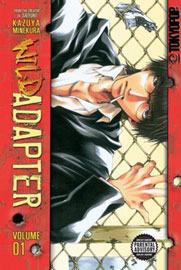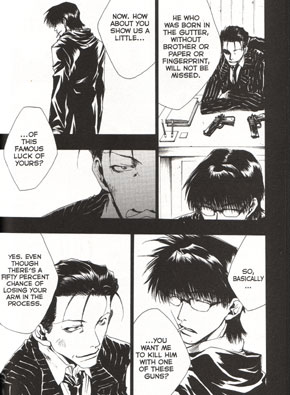|
|
If there was one manga series I was surprised that I enjoyed it was Saiyuki. Kazuya Minekura's take on an ancient Chinese legend may have been distinctly female-orientated but it was also action-packed, well drawn and damn addictive to read. Despite how much I liked Saiyuki though, I'd never checked out any more of Minekura's work. Until now. Wild Adapter is a completely different kettle of fish to Saiyuki, although you may not guess it from the cover art. The story follows the cold and emotionless Makoto Kubota, a young man who's cool demeanour, focus and skill at Mah-jongg bring him to the attention of the Izumo Yakuza group. Impressed with his intelligence and presence the head of the Izumo group offers him a position as head of their youth section, and Kubota - who's looking for something to keep him occupied - accepts. Now embroiled in the Tokyo underworld Kubota begins to build a reputation within the group due to his calm efficiency and lack of fear. His underlings idolise him and his ruthlessness is helping a yakuza power shift towards Izumo. However, just when things are looking up, a strange new drug appears on the streets. Known as W.A. (the titular Wild Adapter I assume), the drug seems to give an immense high but has bizarre side effects that cause the human body to change - with fatal consequences. When one of his Izumo subordinates gets embroiled with the drug, Kubota gets inadvertently drawn into the mystery surrounding it. The plot thickens when he finds a young victim of the drug on the streets, and decides to take him in... Like I said at the start, Wild Adapter is a different
kettle of fish from Saiyuki. The setting is modern day Japan for
one, but the main difference is that it is a hell of a lot more adult.
With Tokyo's shady criminal underground providing the backdrop for the story
it's unsurprising that it's filled with violence, sex and murder. However,
it is surprising how much of an anti-hero Kubota is. |
|
Now, fans of Saiyuki will no doubt be thinking that anti-heroes are nothing new for Minekura, but Sanzo and co have nothing on Kubota. He is a callous, cold and aimless guy who becomes a gangster simply for something to do. He thinks nothing of killing or beating someone to a bloody pulp, but doesn't seem to revel in it either. Nothing seems to drive him apart from the need for a challenge, and it makes him a very unlikeable character that's very hard to understand or identify with. You may wonder what the problem is with this. Many manga and anime series have lead characters on the wrong side of the law or morally challenged, but the difference between Wild Adapter and many others is that Kubota is too much of a blank slate. He seems to have no aims, no emotions and no desires. He's childlike in some ways, but you get the impression that there's nowhere to develop his character. Certainly you learn very little about him in this first volume, and his character doesn't evolve at any point. Considering the story in this first volume nearly completely hinges on him it's a big blow that he's such a one-dimensional character. And then there's the story. This first volume is very character driven, and with the void that is Kubota sitting in the middle of it the driving falls |
|
|
to the supporting cast. Luckily some of the other cast members are decent, especially the crooked detective Kasai and Kubota's chief subordinate Komiya. Unlike Kubota, Komiya has emotions, desires and an aim, and his character develops through the course of the book. He's a far more interesting and human character than Kubota, and thankfully he's important enough to the story to keep it interesting. However, the story in this volume has a bit of an abrupt end, and what follows it seems mostly unrelated. When you read it you get the impression that you're reading a prologue, and the story will have little bearing on the main plot other than to introduce a couple of characters and to provide a bit of background for Kubota. What makes it more surprising is that this is actually the case, and Minekura admits it in a comment at the end of the volume. This leaves you wondering what the point of this book is. If - as the author states - it is to introduce the main characters and help you form an opinion of Kubota, it's a bit of a failure. Most of the characters have very small parts in this volume, in a few cases just a handful of panels, and I was left with the opinion that Kubota is a complete tosser. If the characters will all grow and change in the main story then it makes this volume a bit redundant. At the end of the day there are a good few things to like about Wild Adapter. The art is good and the stark use of black and white with few greys is certainly striking. The character design is good too, even if many characters look far too similar to those in Saiyuki (Kubota is the spitting image of Cho Hakkai for example). However, story-wise only Komiya's story and actions really engage you and keeps things interesting. He brings a bit of humanity to a volume which should supposedly hinge on Kubota, but despite his best efforts the story still seems mostly pointless and some of the other characters are severely underdeveloped and stereotypical. In fairness the real story hasn't started yet and there is some decent drama and action in Wild Adapter vol 1, but really unless the idea of handsome but emotionally bereft bad boys killing each other and a glut of gay yakuza bosses floats your boat you're best off looking elsewhere. Extras: Three striking pieces of Minekura's artwork grace the first couple of pages in the book, and better still they're printed in colour (except one, which is meant to be in black and white). Other than this though there's a brief comment from the author at the end of the book, a next volume preview and a handful of adverts for other Tokyopop manga. Oddly there's also an advert for Pocky, which suggests that manufacturer Glico may be releasing everyone's favourite anime snack in the US. Ratings Feature:
|








